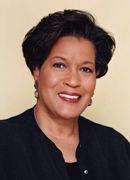
Myrlie Evers-Williams joined MU in commemorating the legacy of Martin Luther King Jr. Jan. 28 in Missouri Theatre.
She began her speech by peering from the bright stage at the audience bathed in darkness. She asked the theater crew to bring up the house lights. “It has always been difficult for me to talk to people I can’t see,” Evers-Williams said. “In my background, darkness means hiding something. It means hiding something that is more than likely waiting to attack you.”
Evers-Williams is a former NAACP chair and the widow of Medgar Evers, a Mississippi civil rights activist murdered in 1963 by a member of the White Citizens’ Council. Evers-Williams is the author of several books on civil rights. On Jan. 21, 2013, she delivered the invocation at President Barack Obama’s second inauguration.
Evers-Williams said that much remains to be done regarding race relations in America. Still, she is hopeful. “I pray that America has reached the point where we will look at the past and be able to move forward,” she said. “I know that is what Dr. King would want. I know without a doubt that is what Medgar Evers would want.
“He used to say, ‘Freedom is not free. You must earn it.’ ”
Evers-Williams had to earn hers. The challenges for an African-American woman in the South in the 1960s and Evers’ influence taught her to be strong. “I was a shy, timid little thing,” Evers-Williams said. “Medgar believed in me.”
In the arenas of corporate America and civil rights leadership, Evers-Williams’ gender prevented her from advancing, she said. “I will sum up my response with a response I gave to some of the men in the NAACP, who said, ‘You can’t do anything. You’re just Medgar’s widow.’ I am not going to tell you everything I said, but the gist of it: ‘Move out of my way.’ ”
During the question-and-answer portion, a college-age audience member asked if Evers-Williams and her husband wanted to quit civil rights activism after their house in Jackson, Mississippi, was fire bombed in 1962.
“I have been able to get over the hatred and put that [energy] into doing whatever is good and right to hopefully make it a better place for you and your generation,” she said.
Evers-Williams called young people to action. They will be the ones who make King’s dream come alive, she said.
“Forgive my grammar, but it ain’t over yet.”
— Alaina Lancaster